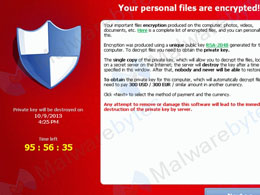
FBI: Malware Victims Should Pay Bitcoin Ransoms
Victims of malware, such as bitcoin ransomware Cryptolocker, should just pay off the perpetrators if they want to see their data again, an FBI agent has advised. According to Security Ledger, Acting Special Agent Joseph Bonavolonta, who oversees the bureau's Boston office, told C-level executives at Wednesday's Cyber Security Summit they'd be better off stumping up the ransom. According to an FBI report from June, this sum can be anywhere from $200 to $10,000. Bonavolonta said: "The amount of money made by these criminals is enormous and that's because the overwhelming majority of....
Related News
TorrentLocker is one of the cyber world's most recent forms of ransomware, infecting several computer systems all over the globe and taking data hostage, refusing to release it unless a bitcoin ransom is paid. As of now, the primary victims appear to be countries in Europe. Nations such as Italy, Germany, France, Spain and the Czech Republic are on the list of prime targets, along with other nations such as the U. K., Australia and Canada. But a big shocker, however, is that out of approximately 40,000 victims only about 570 have ultimately paid the bitcoin ransom that TorrentLocker....
Palo Alto Networks has discovered a unique malware family that can mine bitcoins via the victim’s CPUs and GPUs. The malware, called PWOBot, is completely written in Python and compiled via PyInstaller, generating a Microsoft Windows executable, according to a Palo Alto Networks posting. The malware has affected European organizations, mainly in Poland. A Polish file-sharing service delivers the malware. The malware can download and execute files, log keystrokes, execute Python code and mine bitcoins via the affected computers’ GPUs and CPUs. The malware has been noticed as far back as....
Dridex, the banking malware affecting thousands of computers to cause losses in tune of millions has evolved to become a bitcoin ransomware delivery platform Dridex, the well-known banking malware has been compromising computers by infecting the all prevalent macros in Microsoft Office suite. The Dridex Malware has been known to steal personal information and banking credentials after gaining access to the system disguised as an MS Word attachment received in a spam mail. The malware may now have the capability of delivering bitcoin ransomware to target computers, causing additional damage....
Bitcoin-stealing malware has drained the wallets of many unlucky victims over the years. The more valuable and understood Bitcoin becomes, the more such attacks can be expected. Common sense security practices, like not opening random links or attachments in unsolicited emails, certainly help to lower the risk of malware infection. But unless your bitcoins funds are vaulted within an air-gapped device or consigned to a paper wallet, it's hard (if not impossible) to eliminate the threat of malware entirely. Yet a cunning new web service, known as Bitcoin Vigil, employs an unsecured,....
The U.S. Federal Bureau of Investigation (FBI) has released an alert that warns private industry in the country about incidents of harassment of victims made by ransomware gangs, such as the well-known Doppelpaymer group. FBI Is Aware of Cold-Calling Tactics by Ransomware Gangs According to a PIN (private industry notification) alert regularly sent to U.S. companies to inform them about the latest updates in the cybersecurity sphere, shared by Zdnet, the FBI has been aware of incidents since February 2020, where Doppelpaymer has cold-called companies to intimidate victims by demanding them....





